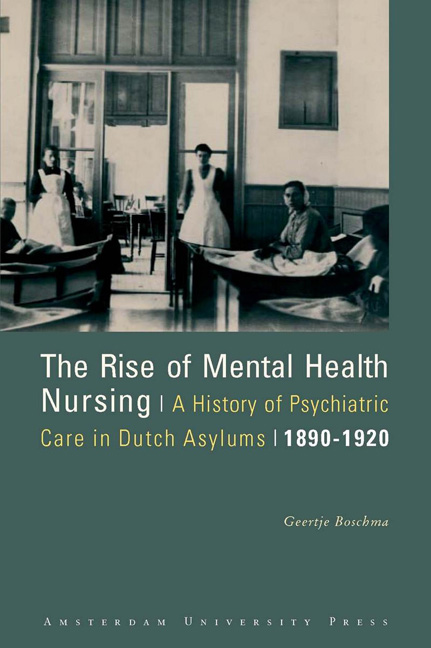Book contents
- Frontmatter
- Contents
- Acknowledgments
- Introduction
- Chapter I Asylum Reform Ideals: Personnel Matters
- Chapter II The Ideal of a Mental Hospital
- Chapter III Female Compassion: Mental Nurse Training Gendered Female
- Chapter IV The Burdensome Task of Nurses
- Chapter V Negotiating Class and Culture
- Chapter VI The Marginalization of Male Nurses
- Chapter VII Controversy and Conflict over the Social Position of Nurses
- Conclusion: The Politics of Mental Health Nursing
- Appendix
- Notes
- List of Illustrations
- List of Abbreviations
- List of Archives
- Bibliography
- Index
Chapter II - The Ideal of a Mental Hospital
Published online by Cambridge University Press: 28 January 2021
- Frontmatter
- Contents
- Acknowledgments
- Introduction
- Chapter I Asylum Reform Ideals: Personnel Matters
- Chapter II The Ideal of a Mental Hospital
- Chapter III Female Compassion: Mental Nurse Training Gendered Female
- Chapter IV The Burdensome Task of Nurses
- Chapter V Negotiating Class and Culture
- Chapter VI The Marginalization of Male Nurses
- Chapter VII Controversy and Conflict over the Social Position of Nurses
- Conclusion: The Politics of Mental Health Nursing
- Appendix
- Notes
- List of Illustrations
- List of Abbreviations
- List of Archives
- Bibliography
- Index
Summary
The rhetoric about the poor quality of asylum personnel took on a new dimension in the late nineteenth century. The traditional complaints about the low social standing of personnel did not disappear but acquired new import. As of the late 1880s asylum doctors argued that asylum personnel should be better trained in medical matters. The class-based complaint that attendants lacked a philanthropic attitude became intertwined with the class- and gender-based argument that they lacked the skill and expertise of nurses experienced in taking care of the sick. The shift in thinking and the new demand for nursing expertise emerged in the context of the rise of scientific psychiatry and new medical explanations of insanity after 1870. Psychiatrists aspired to a dual goal of uplifting their own status as practitioners of a scientific, medical discipline and of changing the traditional asylum into a mental hospital.
The early nineteenth-century optimism that the mentally ill could be cured by a humane, moral therapeutic regimen dwindled. Strongly affected by the cultural impact of the scientific ideals of the time, psychiatrists began to orient themselves to the values and findings of the natural sciences. They began to study specific organic causes of mental disease, giving up older holistic notions of insanity as an imbalanced state of mind and body. The forceful example of the general hospital's rising success became a strong impetus for change in psychiatry. The metaphor of fighting contagion and illness within an orderly, clean hospital in which symptoms of disease could be controlled gained enormous prestige and momentum in the late nineteenth century and raised the status of hospital medicine. With the introduction of anesthesia, antiseptics and aseptic procedures, surgical treatments could successfully be performed. Doctors became strong advocates of hygienist hospital reform in order to make them safe and acceptable places of treatment for the middle class. In response to the rising status of hospital medicine, psychiatry began to model the asylum after the example of the general hospital.
Psychiatrists argued that the mentally ill needed to be treated in ways similar to hospital patients. This idea first gained ground in Germany, but it soon spread to the Netherlands. Relying on the new organic explanations of mental and physical exhaustion to explain insanity, they subjected asylum patients to a regimen of bed rest, good food and somatic treatments.
- Type
- Chapter
- Information
- The Rise of Mental Health NursingA History of Psychiatric Care in Dutch Asylums, 1890–1920, pp. 59 - 80Publisher: Amsterdam University PressPrint publication year: 2003



